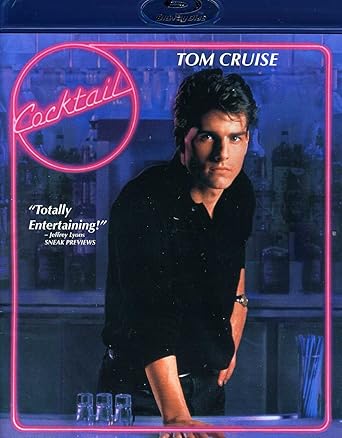Movie Review: Cocktail (1988)
Cocktail (1988) is more than flair bartending and ‘80s charm it’s a stylish, surprisingly introspective look at ambition, ego, and finding what really matters.
DRAMAROMANCE

★★★★★
It’s not just drinks and drama it’s about chasing the wrong dreams and learning how to start over.
Jason R.
New Jersey
If you only remember Cocktail (1988) for the bottle flipping and that Beach Boys song, I get it. On the surface, it’s a glossy, booze-fueled Tom Cruise vehicle the kind of movie that’s often reduced to its aesthetic. But rewatching it now, decades later, Cocktail reveals itself as a fascinating time capsule of 1980s ambition, masculinity, and the American dream… with a few umbrella drinks tossed in.
Directed by Roger Donaldson and based on the novel by Heywood Gould, Cocktail follows Brian Flanagan (Cruise), a fast-talking, smooth-smiling Army vet who wants to “make it big” in New York City. He’s got ambition but no college degree, so he takes a job bartending, where he meets mentor-turned-frenemy Doug Coughlin (Bryan Brown). From there, it’s a ride through cocktails, corporate ladders, romantic misadventures, and existential disillusionment all with that signature ‘80s shine.
Tom Cruise and the Art of the Showman
Let’s talk about Tom Cruise, because his performance in Cocktail is both iconic and underrated. At this point in his career, he had already broken out in Top Gun, and Cocktail was supposed to cement his place as Hollywood’s hottest young star. It did but it also gave him something a little more complex to play with.
Brian Flanagan isn’t a hero. He’s cocky, selfish, and often clueless about what he really wants. But Cruise sells it. He manages to make Brian likable even when he's screwing things up, and there’s a vulnerability beneath the bravado that hints at a deeper insecurity. This isn’t just a charisma showcase (though there’s plenty of that) it’s a study in performative masculinity, long before that became a common phrase in film discourse.
And don’t sleep on Bryan Brown as Doug. He’s cynical, world-weary, and endlessly quotable (“Coughlin’s Law: Bury the dead, they stink up the joint.”). Doug is equal parts guru and cautionary tale, and his arc is one of the film’s biggest gut punches something not often discussed in surface-level reviews.
Beyond the Bar Tricks: The Dark Side of the Dream
What’s often missed in conversations about Cocktail is how bleak it actually is beneath all the neon and steel drum beats. This is a movie about failure, ego, and the illusion of success. Brian starts off chasing money, prestige, and power and one by one, those things hollow him out. The film flirts with being a rags-to-riches story but ultimately lands somewhere more nuanced: rags-to-existential crisis.
There’s a scene in the second act where Brian’s ambition literally costs him everything his mentor, his girlfriend (played by Elisabeth Shue), and his dignity. It’s not subtle, but it’s effective. And unlike many '80s films, Cocktail doesn’t resolve everything with a shiny bow. Yes, there’s redemption, but it’s earned not handed out with a martini.
Even the tropical paradise scenes (filmed in Jamaica) are tinged with disappointment. The beach bars and tan lines feel more like an escape from failure than a reward. It’s escapism, sure but it’s also a temporary illusion, and the movie makes you feel that hangover when it’s all gone.
The Soundtrack That Defined a Summer (For Better or Worse)
Yes, we have to talk about “Kokomo.” Whether you love it or hate it, there’s no denying that The Beach Boys’ 1988 hit became synonymous with Cocktail. But beyond that sun-soaked earworm, the soundtrack is a fascinating blend of late-‘80s pop, soft rock, and Caribbean influences all of which reflect the film’s duality between ambition and escape.
Tracks from Starship, Bobby McFerrin, and Little Richard play like an auditory time machine. They're fun, but they also add to the film's heightened sense of artificiality a sonic mirror of the characters’ performative lives.
A Time Capsule of 1980s Excess
From a visual standpoint, Cocktail is peak 1980s: slick hair, pastel blazers, mirrored interiors, and skyline dreamscapes. But unlike other films of the decade that glorified wealth (Wall Street, The Secret of My Success), Cocktail feels like a critique dressed up as a celebration.
It's as if the film wants you to be seduced by the fantasy the money, the women, the flashy bar tricks before pulling the rug out and saying, “Yeah, but what happens when it’s all gone?”
This duality is what makes Cocktail so intriguing on a re-watch. It’s both a product of its time and a subtle commentary on that time. Brian’s journey isn’t just about learning to be a better bartender or boyfriend it’s about confronting the lie that ambition alone will bring you happiness.
Final Thoughts from Box Review
At Box Review, we don’t just watch the movie we look for the layers, the hidden threads, the emotional truths that get buried under dated soundtracks and big star performances. And Cocktail has a lot more going on than it’s given credit for.
Is it a cheesy, overproduced slice of late-’80s cinema? Absolutely. But it’s also a strangely melancholy exploration of manhood, ambition, and identity. It’s a film about realizing that the thing you’re chasing might not be what you really need and finding something real in a world full of illusions.
Plus, let’s be honest it still makes bar-tending look cooler than it has any right to.
Box Review
Stay connected and follow us on social media for the latest reviews, movie highlights, and behind-the-scenes content.
© 2025-2030. All rights reserved.
Privacy & Legal
Join Our Newsletter!
RSS Feed
Built with ❤️ by CupidName.com

